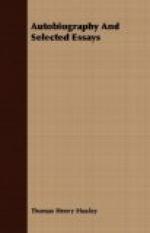2. Are the words general or specific in character?
3. How does Huxley make his subject-matter attractive?
4. From what sources does Huxley derive his words? Are they every-day words, or more scholarly in character?
5. Do you find any figures? Are these mainly ornamental or do they re-enforce the thought?
8. Are there many allusions and quotations? Can you easily recognize the source?
7. Pater says in his essay on Style that the literary artist “begets a vocabulary faithful to the colouring of his own spirit, and in the strictest sense original.” Do you find that Huxley’s vocabulary suggests the man?
8. Does Huxley seem to search for “the smooth, or winsome, or forcible word, as such, or quite simply and honestly, for the word’s adjustment to its meaning”?
9. Make out a list of the words and proper names in any given essay which are not familiar to you; write out the explanation of these in the form of notes giving any information which is interesting and relevant.
D. General questions on style.
1. How is Huxley’s style adapted to the subject-matter?
2. Can you explain the difference in style of the different essays by the difference in purpose?
3. Compare Huxley’s way of saying things with some other author’s way of saying things.
4. Huxley says of his essays to workingmen, “I only wish I had had the sense to anticipate the run these have had here and abroad, and I would have revised them properly. As they stand they are terribly in the rough, from a literary point of view.”
Do you find evidences of roughness?
THOMAS HENRY HUXLEY — AUTOBIOGRAPHY [1]
And when I consider, in one view, the many things . . . which I have upon my hands, I feel the burlesque of being employed in this manner at my time of life. But, in another view, and taking in all circumstances, these things, as trifling as they may appear, no less than things of greater importance, seem to be put upon me to do.—Bishop Butler to the Duchess of Somerset.
The “many things” to which the Duchess’s correspondent here refers are the repairs and improvements of the episcopal seat at Auckland. I doubt if the great apologist, greater in nothing than in the simple dignity of his character, would have considered the writing an account of himself as a thing which could be put upon him to do whatever circumstances might be taken in. But the good bishop lived in an age when a man might write books and yet be permitted to keep his private existence to himself; in the pre-Boswellian [2] epoch, when the germ of the photographer lay concealed in the distant future, and the interviewer who pervades our age was an unforeseen, indeed unimaginable, birth of time.




